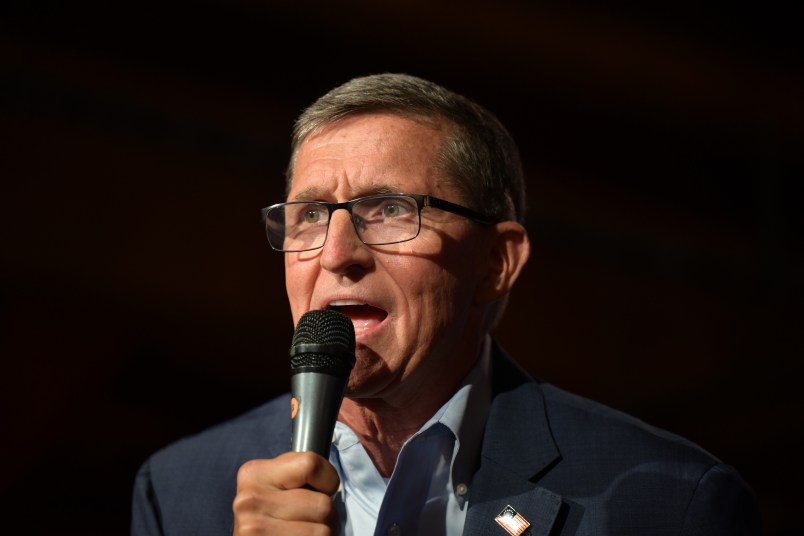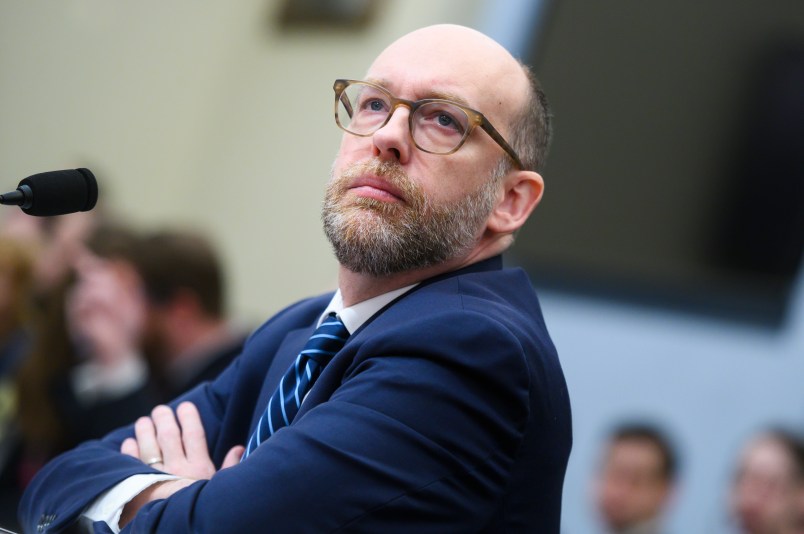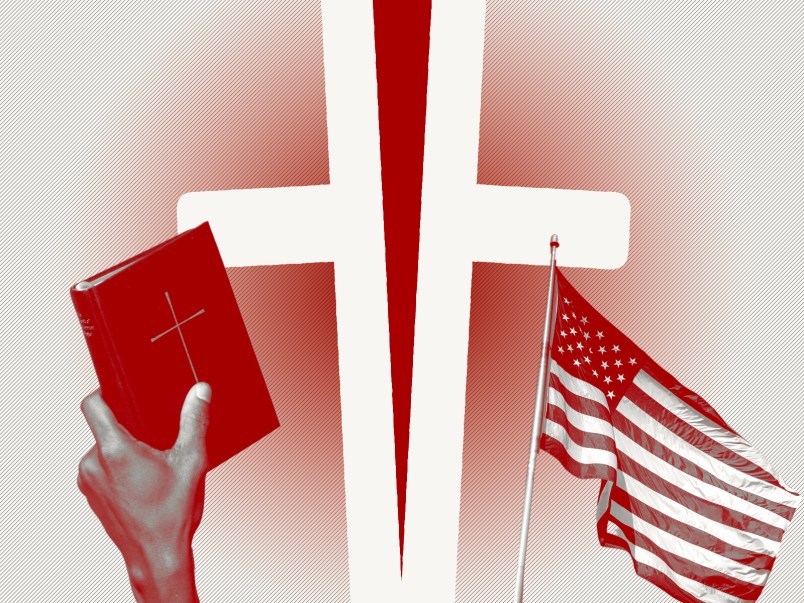Within the world of conservative Christians, there are some who survey what the Christian nationalists want and recoil.
Some of Christian nationalism’s opponents within the Christian right are pastors, some of them are writers. Others describe themselves as theologians; others are media figures. Many refuse to speak out publicly for fear of harassment; others who do speak out do so in muted, measured tones, as if quietly chiding a prodigal son.
They’re a small group. It’s one thing to speak out against the movement as a Democratic politician or member of a left-leaning organization; any association with the left immediately earns you hefty skepticism in these communities. But it’s another to speak out against it as someone who Christian nationalists might otherwise perceive as a member of their movement. All of these messengers, some of whom have assailed Christian nationalism as hearkening back to the worst political tendencies of early 20th-Century Europe, are devout Christians public in their devotion, and they are very far to the right.
They have different reasons for opposing Christian nationalism, but tend to agree on a few key points: patriotism and faith are best kept separate; a government imposing faith-based behavior on its citizens would be corrupt in a theological sense; Christian nationalists can slip into advocating for a kind of authoritarianism which views certain kinds of Christians as an in-group to be privileged above all others, and flirts with ethnonationalism.
The intra-Christian-right discussion around Christian nationalism is important both because of the movement’s embrace of authoritarianism, and because of how influential Christian nationalism has become among those planning for a second Trump term. Russ Vought, who ran the Office of Management and Budget for the last two years of Trump’s presidency, came out relatively early in support of Christian nationalism and has echoed its themes in advocating for hardline border proposals.
One Christian leader who has spoken out against Christian nationalism is Josh Buice, pastor of Pray’s Mill Baptist Church in Georgia and founder of G3, an evangelical ministry. The ministry (G3 stands for Gospel, Grace, Glory) has grown over the past several years to become one of the country’s largest evangelical networks, hosting a conference and a media entity that publishes thinkpieces on Trump and abortion, what the Ten Commandments tell us about socialism, and, in April 2023, how Buice thinks about Christian Nationalism. Buice has also engaged in debates about Christian nationalism on social media. But this debate, he says, isn’t just the province of the very online and the MAGA elite.
“There’s a great number of people in the middle of this debate that would say, ‘the left has overreached. They’re transing kids, they’re grooming children in schools. And so we need to stand against this movement. And in order to do that, we just need to have a Christian nation.’ And so that’s sort of the bedrock foundational ideology that’s pushing a lot of people in that direction,” Buice told TPM.
“The problem is, you can overcorrect. It’s sort of like driving down the road in your SUV and you look down at the radio and then you go off the road just a bit — and then you overcorrect, and you end up flipping down the road and there’s a massive catastrophe.”
Buice is an outspoken conservative, Christian activist (“abortion is nothing short of legal child sacrifice,” he writes in one post on G3’s website) but he argues that a government-mandated Christianity presents theological problems. The rules governing our relationship to God must be kept separate from those defining our relationships with one another, he argues — the former is theology, the latter is politics.
It’s in that theological language that Buice frames his opposition to the movement, expressing incredulity to TPM that the government could make people “bow to God in name only, when they’re really pagan.”

“Pagan,” in his argument, describes those who disagree with the results of the broad Christian nationalist agenda: using federal power to criminalize abortions, end same-sex marriage, and generally use the law to instruct people who to live their lives in accordance with a specific interpretation of Christianity. But this sort of Christian nationalist government would present problems for a “pagan” and a Christian alike, Buice told TPM.
“I think you can overcorrect by giving the power of a civil magistrate the opportunity to determine what is blasphemy and then to punish accordingly,” he said. “And I think that that could lead to a perversion: What definition of blasphemy are we talking about? And now we end up allowing for true Christians to be persecuted simply because they refuse to bow or tow the line on a specific set of beliefs.”
Buice walks a thin line in his commentary. On the one side, he has expressed “concern” about the way in which key, far-right influencers talk about Christianity in politics, identifying Mike Flynn as a key Christian nationalist influencer who has held revival-like events in which he’s called for divine retribution. On the other, Buice is careful to limit his critique to the theological problems he believes Christian nationalism poses, staying away from publicly examining aspects of the movement that seek to replace American pluralism, and critics who see Christian nationalism as a bid to further empower white, religious men over all others.
Another pastor who has spoken out against Christian nationalism is Ligon Duncan, Chancellor of the Reformed Theological Seminary. Duncan is a high-profile figure in the world of evangelical Christianity, and helped found the Gospel Coalition, a national network of evangelical and Calvinist churches.
In one podcast hosted by the group, he assailed Christian nationalism as a reaction to a “sense of the loss of influence in culture,” and called those who advocate for it a “tiny” and “evil group.” Elsewhere, Duncan called Christian nationalism “childish,” saying “you don’t want people having their consciences forced.”
It’s a critique of Christian nationalism — driven by a small group of young men disaffected by their lost status in the culture — which sounds like it could come from a liberal, but, like Buice, Duncan is anything but. He’s had his own set of controversies, mainly around advocating for keeping women from becoming preachers. As part of that argument, he suggested earlier in his career that women should remain silent in the church.
His criticisms of Christian Nationalism are piecemeal, made in places where you have to go looking to find them. Nonetheless, Duncan has received backlash for his remarks; two pastors who fell under Duncan’s criticism later went on a podcast on which he had also appeared to chastise people for attacking him.
William Wolfe, a former Trump appointee and Russ Vought acolyte who has taken the Christian nationalist label and run with it, called Duncan’s remarks “ill-informed and unhelpful” in an interview with TPM. Wolfe helped publish a draft Statement on Christian Nationalism last year along with Dusty Deevers, an Oklahoma state senator who has advocated for an end to no-fault divorce, a writer who has pushed for murder prosecutions for women who have abortions, and others.
“Not only are Christians under attack in this country in ways that they have never been before, which Ligon fails to mention, but self-identified Christian nationalists such as Dusty Deevers are gaining real political ground, which Ligon apparently ignores,” Wolfe told TPM.
The conflict between Christian nationalists and the staunch Christian conservatives who oppose their movement is at its most revealing around the question of race.

Stephen Wolfe, no relation to William, published The Case for Christian Nationalism in 2022. The book has since become a touchstone in the discussion, in part because Christian nationalism is a term that encompasses multiple competing definitions, and in part because he offers an aggressive and lengthy defense of the movement.
But Wolfe goes beyond what most other Christian nationalists are willing to discuss publicly. He calls for “cultural similarity,” writes that “to exclude an out-group is to recognize a universal good for man,” and, towards the end of his book, mounts a defense of a “more exclusive and ethnic-focused” vision for America.
It feeds into a larger sense among critics of Christian nationalism that this is less about faith and mostly about nationalism, with various shades of Christianity serving as in-groups from which to exclude others. Wolfe brings up ethnicity in The Case for Christian Nationalism, raising serious questions about whether self-professed Christian nationalists intend to hold Christianity supreme over other religions, or if they seek to go even further, excluding large swaths of America not just due to their religion but due to their race and ethnicity as it goes about creating a new American identity.
Wolfe denies in the book that he’s making a “white nationalist” argument, but his critics on the Christian right aren’t so sure.
“By God’s grace, America has made great strides in overcoming racism in the past 60 years,” wrote Kevin DeYoung, a North Carolina pastor, in a review of the book. “I fail to see how Wolfe’s vision isn’t a giant step in the wrong direction.”
When I put this question to Buice, he hedged.
“I don’t think it’s appropriate to take everyone into the Christian nationalist debate and say they’re all white Christian nationalists,” he told TPM. “I would have problems with Stephen Wolfe’s position, but I think it’s unfair to say anyone who calls themself CN or Christian nationalists should be put in the category of white Christian nationalism.”
It’s a pretty tame critique considering what Wolfe is suggesting.
Many of the critics, including Buice, Duncan, and DeYoung, are pastors who double as figures in the right-wing media: they are constrained in what they can say in part out of an effort to maintain credibility with their audiences. The harassment that already comes their way doesn’t help. In some ways, the anti-Christian nationalist right echoes the never-Trumpers: earnest, at times vocal, but often impotent and hemmed in by their own need to retain an audience.
One figure who is immune to these pressures is Blake Callens, a North Carolina software engineer and Baptist who read Wolfe’s book and found it horrifying. He responded by writing a book of his own to counter it, and by engaging furiously with Christian nationalists on Twitter. Callens has a small following, but managed to get under his opponents’ skin: Stephen Wolfe blocked him on X after multiple exchanges; others have labeled him “obsessive” and a “fed.”
Callens, with no real need for an audience, has stood his ground. Part of his project is taking the debate into a realm the more prominent critics of Christian nationalism largely avoid: trying to separate out the Christian right’s policy agenda from what he regards as the threat posed by Christian nationalism more broadly.
“You are not countering bad theology and doctrine,” Callens wrote in a critique of Christian nationalism’s more cautious critics. “You are countering early 20th century authoritarian nationalism with ‘Christian’ grafted on.”







Thank you for this very well researched article. It is useful to see the complexity in what seems to be a monolith from the outside.
Who’s more dangerous: the incels who look and sound like they peaked with admission into their prison gang, or the guys who believe their own bullshit so purely that they’re embarrassed by the first group?
Is there such a thing as an evangelical Christian and if so…does it mean they’re some form of sooper dooper Christian or have they just taken on a name to make something of themselves? What does one have to do to become an Evangelical? It seems no more than adopt the name and then expect the fame. Like being a Biker. No work. No study. No dedication. Just claim the name. So why do these folks deserve one squats more consideration than regular Christians? Or folks that haven’t joined the Christian club but live the life expected of a Christian. Why do we talk about them as if they’re deserving of something from us? Some heightened reverence.
They are not really a thing and they don’t matter.
In both bullshit is the salient factor. Incells claim to reject woman for some principled reason or another when what’s really going down is woman reject them. In the case of Evangelicals the game is being a superlative Christian thinking that makes them deserving. Both full of shit. Both to be rejected.
A popular conservative thought is that no money should be spent on foreign aid when there are so many problems here in the United States. I’ll take it under advisement when the idea starts penetrating churches.
One thing I like to do when I hear rightists bitching about some problem such as homelessness, is google up how many churches there are in the state, vs how many homeless people there are.
Churches outnumber homeless in so many states that my third question is why are churches begging for more money to send their own kids to summer camp and to go on junkets in Africa and Central America, than to help Americans right here at home?
Talk about only understanding their critique when they’re issuing it against other people. If only there had been a wise and well respected Teacher who ever had anything to say about that.